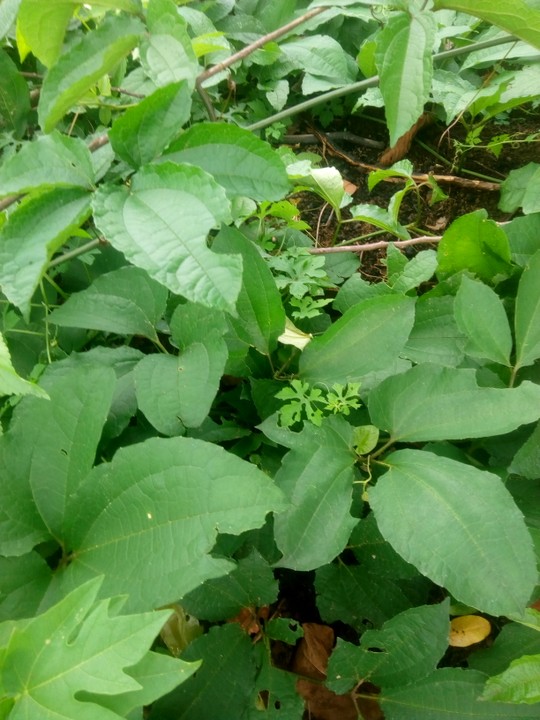Hello and welcome back to the blog, we would be looking at Ugu Farming in Nigeria.
If you are looking to start a profitable farming business in Nigeria, ugu farming is worth considering.
I have this post to the fullest and made it easier than it should.
Lol
Ugu, also known as fluted pumpkin, is a highly nutritious vegetable that is widely consumed in Nigeria and many other African countries.
In today’s post, we will provide you with all the information you need to know to start ugu farming in Nigeria.
Why Ugu Farming in Nigeria is Profitable
Several factors make ugu farming a good way to make money. First of all, ugu is a very healthy and popular vegetable in Nigeria and many other African countries.
It has a lot of vitamins, minerals, and antioxidants, so people who care about their health often choose it.
Secondly, ugu is easy to grow and doesn’t need a lot of help.

It can grow in sandy loam, loamy soil, and clay soil, among others, and does not require much water. Because of this, it is a great crop for small farmers who may not have a lot of land or water.
Third, it only takes about 70 days for ugu to grow, so farmers can get more than one harvest per year.
How to Start Ugu Farming in Nigeria
It is not too tough to get started with ugu farming in Nigeria. The steps that need to be followed are as follows:
Choose a Suitable Location
The selection of an appropriate area is the first thing that needs to be done when farming ugu.
Ugu is most successful in regions that have a temperature that is warm and humid, as well as soil that drains well.
It is essential to select a spot that gets an adequate amount of sunlight and offers adequate drainage to avoid the risk of waterlogging.
Prepare the Soil
Once you’ve found a good spot, the next step is to get the soil ready. Ugu grows best in soil that is rich in organic matter and has good drainage.
To get the soil ready, get rid of all the weeds and trash on the land and plow it to a depth of about 20 to 30 cm.
If the soil is not fertile, you can make it more fertile by adding things like compost or manure.
Planting
Now let’s get to the real deal, why we are here. Lol.
The second stage, which follows the preparation of the soil, is to plant the ugu seeds. There are two options for planting ugu: either in the ground or in seed trays.
When planting straight into the ground, make holes that are approximately 2 centimeters deep and spaced 60 centimeters apart.
Put one or two seeds in each hole, then cover them up with the surrounding soil.
If you will be planting in seed trays, first fill the trays with dirt, and then place one seed in each hole. Immediately after sowing, water the seeds thoroughly.
Maintenance
After the ugu seeds sprout, the next step is to take care of the crop. This means giving the plants enough water and fertilizer and keeping pests and diseases at bay.
Ugu needs to be watered often, especially when it’s hot, so it doesn’t wilt. Fertilizers should be put on the soil to help the crop grow and produce more.
Aphids, caterpillars, and powdery mildew are some of the pests and diseases that can affect ugu. Pesticides or natural methods like neem oil can be used to get rid of these.
Harvesting
Ugu is ready for harvest about 70 days after planting. The signs that ugu is ready for harvest include yellowing of the leaves and drying of the stems.
To harvest ugu, cut the stem about 5 cm above the ground using a sharp knife. Leave the roots in the soil as they help to improve soil fertility.
After harvesting, ugu can be sold.
Marketing Ugu in Nigeria
In the ugu farming sector here in Nigeria, sales are a vital component. In Nigeria, marketing ugu can be done in a few different methods, including the following:
Selling to Local Markets
Selling ugu in local markets is one of the most straightforward ways to put it on the market. Local markets can be found in the majority of Nigerian towns.
These marketplaces allow farmers to sell their goods directly to consumers. Farmers can sell their ugu at a price that is competitive by erecting a stall in the market and selling it there.
To bring in more customers, it is essential to make sure that the ugu is both fresh and of high quality.
Retail Wholesalers
Ugu can also be marketed by selling it to wholesalers, who then sell it to retailers like supermarkets and dining establishments.
In most cases, wholesalers are willing to purchase big quantities of ugu at a favorable price.
But, to attract wholesalers, farmers need to make certain that their ugu is of high quality and complies with all of the necessary regulations.
Internet Marketing
Farmers in Nigeria now have the option of selling their ugu on the internet thanks to the expansion of the country’s e-commerce sector.
Farmers who want to display their ugu and attract new consumers might do so by creating a website or a social media page.
The use of online marketing is an effective method for expanding one’s customer base and generating more revenue.
FAQ
What is ugu farming?
Ugu farming is how people in Nigeria grow ugu, which is also called fluted pumpkin. Ugu is a popular vegetable in Nigeria because it is healthy and can be used in many different ways in the kitchen.
What are the benefits of ugu farming?
Nigerian farmers can get a lot out of growing ugu. It doesn’t cost much to grow, doesn’t need many resources, grows quickly, and gives a high return on investment.
Ugu is also a crop that has a lot of nutrients, which makes it a popular choice for people who care about their health.
What is the best time to plant ugu?
The best time to plant ugu in Nigeria is from March to September when it rains most of the time. Ugu needs a lot of water to grow, which is why it grows best during the rainy season.
Is ugu farming profitable?
Yes, growing ugu can be a good way for Nigerian farmers to make money. Ugu has a high return on investment because it is nutritious, grows quickly, and requires few resources.
But farmers may face problems like pests and diseases, trouble getting money, and problems selling their crops.
Conclusion
Ugu Farming in Nigeria provides numerous advantages to Nigerian farmers.
Ugu is a great crop for small-scale farmers because of its high nutritional content, quick growing cycle, and minimum inputs.
Farmers can achieve success in ugu farming and contribute to the expansion of the Nigerian economy by following the procedures given in this book and adopting measures to counteract the hurdles.







